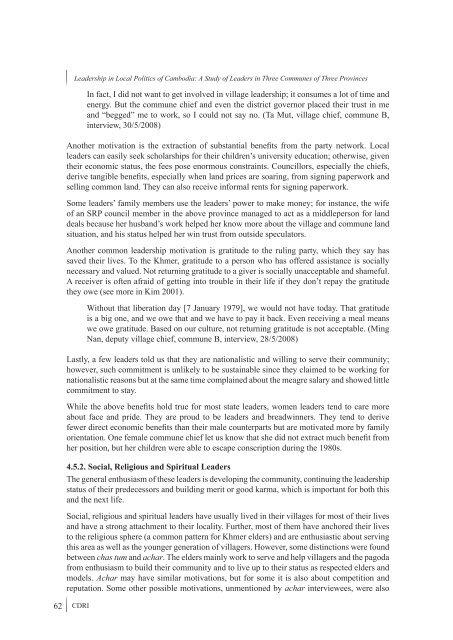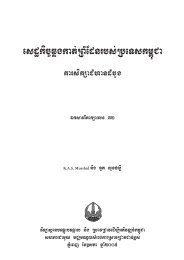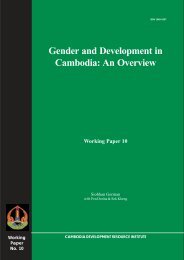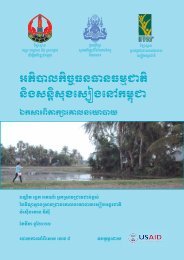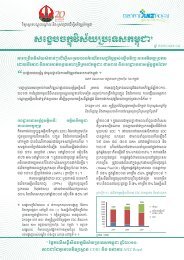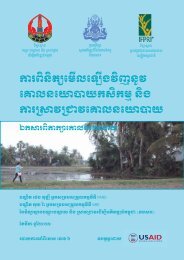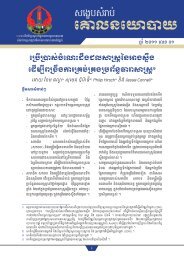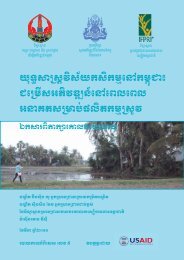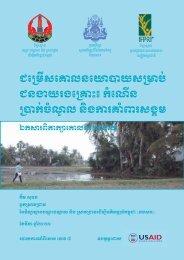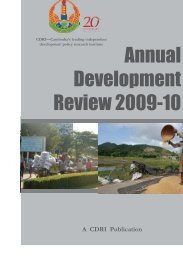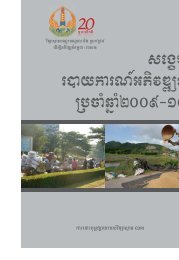Leadership in Local Politics of Cambodia: A Study of ... - CDRI
Leadership in Local Politics of Cambodia: A Study of ... - CDRI
Leadership in Local Politics of Cambodia: A Study of ... - CDRI
You also want an ePaper? Increase the reach of your titles
YUMPU automatically turns print PDFs into web optimized ePapers that Google loves.
62<br />
�������������������������������������������������������������������������������������������������<br />
<strong>CDRI</strong><br />
In fact, I did not want to get <strong>in</strong>volved <strong>in</strong> village leadership; it consumes a lot <strong>of</strong> time and<br />
energy. But the commune chief and even the district governor placed their trust <strong>in</strong> me<br />
and “begged” me to work, so I could not say no. (Ta Mut, village chief, commune B,<br />
<strong>in</strong>terview, 30/5/2008)<br />
�������� ����������� ��� ���� ����������� ��� ������������ �������� ����� ���� ������ ��������� ������<br />
leaders can easily seek scholarships for their children’s university education; otherwise, given<br />
their economic status, the fees pose enormous constra<strong>in</strong>ts. Councillors, especially the chiefs,<br />
���������������������������������������������������������������������������������������������<br />
sell<strong>in</strong>g common land. They can also receive <strong>in</strong>formal rents for sign<strong>in</strong>g paperwork.<br />
Some leaders’ family members use the leaders’ power to make money; for <strong>in</strong>stance, the wife<br />
<strong>of</strong> an SRP council member <strong>in</strong> the above prov<strong>in</strong>ce managed to act as a middleperson for land<br />
deals because her husband’s work helped her know more about the village and commune land<br />
situation, and his status helped her w<strong>in</strong> trust from outside speculators.<br />
Another common leadership motivation is gratitude to the rul<strong>in</strong>g party, which they say has<br />
saved their lives. To the Khmer, gratitude to a person who has <strong>of</strong>fered assistance is socially<br />
necessary and valued. Not return<strong>in</strong>g gratitude to a giver is socially unacceptable and shameful.<br />
A receiver is <strong>of</strong>ten afraid <strong>of</strong> gett<strong>in</strong>g <strong>in</strong>to trouble <strong>in</strong> their life if they don’t repay the gratitude<br />
they owe (see more <strong>in</strong> Kim 2001).<br />
Without that liberation day [7 January 1979], we would not have today. That gratitude<br />
is a big one, and we owe that and we have to pay it back. Even receiv<strong>in</strong>g a meal means<br />
we owe gratitude. Based on our culture, not return<strong>in</strong>g gratitude is not acceptable. (M<strong>in</strong>g<br />
Nan, deputy village chief, commune B, <strong>in</strong>terview, 28/5/2008)<br />
Lastly, a few leaders told us that they are nationalistic and will<strong>in</strong>g to serve their community;<br />
however, such commitment is unlikely to be susta<strong>in</strong>able s<strong>in</strong>ce they claimed to be work<strong>in</strong>g for<br />
nationalistic reasons but at the same time compla<strong>in</strong>ed about the meagre salary and showed little<br />
commitment to stay.<br />
������������������������������������������������������������������������������������������<br />
about face and pride. They are proud to be leaders and breadw<strong>in</strong>ners. They tend to derive<br />
��������������������������������������������������������������������������������������������<br />
��������������������������������������������������������������������������������������������<br />
her position, but her children were able to escape conscription dur<strong>in</strong>g the 1980s.<br />
4.5.2. Social, Religious and Spiritual Leaders<br />
The general enthusiasm <strong>of</strong> these leaders is develop<strong>in</strong>g the community, cont<strong>in</strong>u<strong>in</strong>g the leadership<br />
status <strong>of</strong> their predecessors and build<strong>in</strong>g merit or good karma, which is important for both this<br />
and the next life.<br />
Social, religious and spiritual leaders have usually lived <strong>in</strong> their villages for most <strong>of</strong> their lives<br />
and have a strong attachment to their locality. Further, most <strong>of</strong> them have anchored their lives<br />
to the religious sphere (a common pattern for Khmer elders) and are enthusiastic about serv<strong>in</strong>g<br />
this area as well as the younger generation <strong>of</strong> villagers. However, some dist<strong>in</strong>ctions were found<br />
between ���������and achar. The elders ma<strong>in</strong>ly work to serve and help villagers and the pagoda<br />
from enthusiasm to build their community and to live up to their status as respected elders and<br />
models. ������may have similar motivations, but for some it is also about competition and<br />
reputation. Some other possible motivations, unmentioned by achar <strong>in</strong>terviewees, were also


